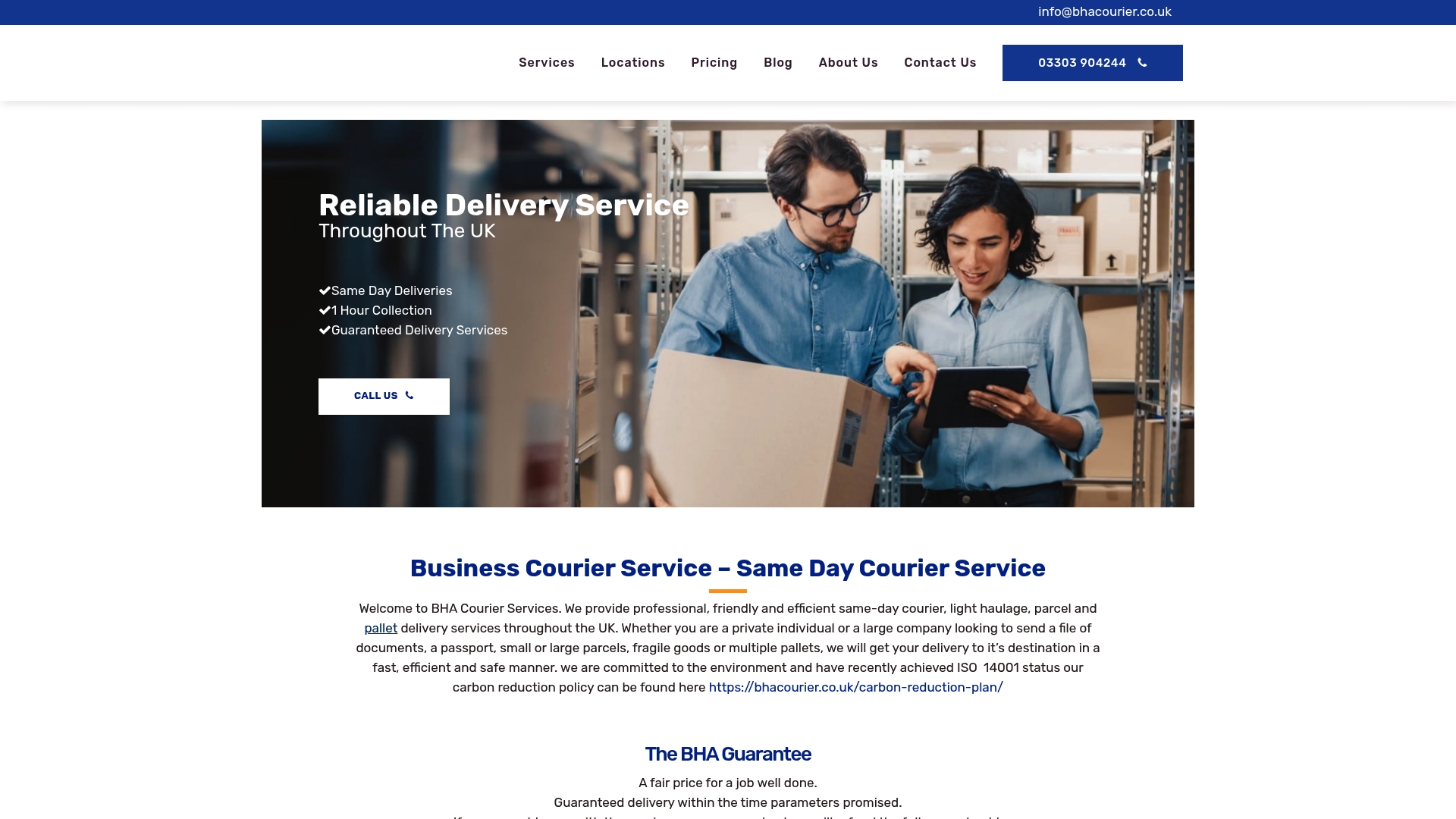
06 Aug Urban Consolidation Centres in 2025: What UK Businesses Need to Know
Urban consolidation centres are changing the face of city deliveries right across the UK. There is a new push for sustainability and efficiency, but surprisingly it is not just about saving the environment. Some UK businesses have cut urban delivery costs by up to 30 percent with these centres. The unexpected part is that smaller firms, not just big corporations, could be the ones to gain the most from this logistics revolution.
Table of Contents
- How Urban Consolidation Centres Work
- Benefits For Small And Medium Businesses
- Impact On Last Mile Delivery And Sustainability
- Choosing The Right Urban Consolidation Centre In The UK
Quick Summary
| Takeaway | Explanation |
|---|---|
| Urban consolidation centres enhance logistics efficiency. | These centres centralise and optimise deliveries, reducing vehicle movements and congestion in urban areas. |
| Small and medium businesses gain competitive advantages. | UCCs allow SMBs to share resources, access advanced logistics, and reduce costs, enhancing their market position. |
| Environmental benefits include reduced carbon emissions. | Using UCCs promotes cleaner delivery methods, thereby lowering the carbon footprint associated with urban freight activities. |
| Choosing the right UCC requires thorough evaluation. | Businesses should assess operational capabilities, financial viability, and strategic location to select an appropriate UCC. |
| Collaborative partnerships enhance operational effectiveness. | Collaboration among stakeholders creates sustainable logistics frameworks, which contribute to operational feasibility and growth. |
How Urban Consolidation Centres Work
Urban consolidation centres (UCCs) represent a sophisticated logistics solution designed to address the complex challenges of urban freight distribution. These strategically located facilities serve as critical hubs that transform traditional delivery approaches by centralising and optimising goods movement within urban environments.
The Core Operational Mechanism
At their fundamental level, urban consolidation centres function as intermediate logistics platforms where goods from multiple suppliers are aggregated, sorted, and then redistributed using more efficient transportation methods. Research from the Transportation Research Journal indicates that these centres dramatically reduce the number of individual vehicle movements into city centres, thereby minimising traffic congestion and environmental impact.
The operational process typically involves several key stages. First, goods from various suppliers are transported to the UCC, where they undergo consolidated sorting and packaging. Specialised vehicles then undertake last-mile deliveries using environmentally friendly methods such as electric vehicles, cargo bikes, or small efficient trucks. This approach significantly reduces the carbon footprint compared to traditional delivery models.
Economic and Environmental Benefits
A comprehensive study published in the International Journal of Physical Distribution and Logistics Management revealed that urban consolidation centres provide multiple strategic advantages. Economically, they help businesses reduce transportation costs by sharing infrastructure and minimising redundant delivery routes. Environmentally, they contribute to reduced urban emissions, decreased traffic congestion, and improved air quality.
The financial viability of UCCs depends on carefully designed business models that integrate multiple stakeholders. Successful centres often collaborate with local authorities, transportation companies, and private businesses to create sustainable operational frameworks. Key considerations include optimal location selection, efficient logistics technology, and robust partnership structures.
By centralising distribution processes, urban consolidation centres represent an innovative solution to the growing challenges of urban logistics. They offer a pragmatic approach to managing increasing delivery volumes while simultaneously addressing environmental concerns and urban infrastructure constraints. As cities continue to grow and e-commerce expands, these centres will become increasingly crucial in maintaining efficient, sustainable urban transportation networks.
Businesses considering urban consolidation centres should carefully evaluate their specific logistical needs, local infrastructure, and potential partnership opportunities to maximise the benefits of this advanced distribution strategy.

Benefits for Small and Medium Businesses
Small and medium businesses (SMBs) stand to gain significant strategic advantages by leveraging urban consolidation centres (UCCs) as part of their logistics and distribution strategies. These innovative logistics platforms offer transformative opportunities for businesses seeking efficient, cost-effective, and sustainable delivery solutions.
Cost Reduction and Operational Efficiency
For SMBs, urban consolidation centres provide a compelling economic proposition. Research from the International Journal of Physical Distribution and Logistics Management demonstrates that businesses can substantially reduce transportation expenses by sharing infrastructure and optimising delivery routes. By consolidating shipments, small businesses can access economies of scale previously available only to large corporations.
The financial benefits extend beyond direct transportation costs. Businesses can reduce vehicle maintenance expenses, fuel consumption, and personnel requirements. Moreover, UCCs enable smaller enterprises to implement more sophisticated logistics strategies without significant capital investment. This approach allows SMBs to compete more effectively in increasingly complex urban markets.
Environmental and Brand Positioning
Urban consolidation centres offer SMBs a powerful mechanism for demonstrating environmental responsibility. A comprehensive European logistics study highlighted that businesses using UCCs can significantly reduce their carbon footprint, an increasingly important consideration for environmentally conscious consumers.
By participating in urban consolidation centre networks, small businesses can showcase their commitment to sustainability. This strategic approach not only reduces environmental impact but also enhances brand reputation. Customers are increasingly making purchasing decisions based on a company’s environmental credentials, making UCCs a valuable marketing tool for progressive SMBs.
Competitive Advantage and Flexibility
Urban consolidation centres provide SMBs with unprecedented logistical flexibility. Small businesses can access advanced distribution infrastructure without substantial upfront investments. These centres enable more frequent, reliable, and precise deliveries, which can significantly improve customer satisfaction and competitive positioning.
The collaborative nature of UCCs allows smaller enterprises to share resources and expertise. This model creates opportunities for networking, knowledge exchange, and potential business partnerships. For more insights on optimising your business logistics, consider exploring additional strategies that complement urban consolidation centre approaches.
As urban landscapes become increasingly complex and e-commerce continues to expand, urban consolidation centres represent a strategic solution for SMBs. By embracing these innovative logistics platforms, small and medium businesses can transform their distribution capabilities, reduce operational costs, and position themselves as forward-thinking, environmentally responsible organisations.
Here is a summary table outlining the key benefits of urban consolidation centres for small and medium businesses:
| Benefit Category | Description |
|---|---|
| Cost Reduction | Minimises transportation, vehicle maintenance, fuel and personnel costs by sharing resources. |
| Operational Efficiency | Optimises delivery routes and enables access to advanced logistics infrastructure. |
| Sustainability | Reduces carbon footprint and helps businesses achieve environmental goals. |
| Brand Reputation | Enhances public perception and appeals to environmentally-conscious customers. |
| Competitive Advantage | Provides access to economies of scale and greater flexibility in delivery options. |
| Networking Opportunities | Facilitates collaboration and knowledge sharing with other local businesses. |
Impact on Last Mile Delivery and Sustainability
Urban consolidation centres (UCCs) are revolutionising last-mile delivery strategies by addressing critical challenges in urban logistics and sustainability. These innovative platforms represent a transformative approach to reducing environmental impact while improving delivery efficiency across urban landscapes.
Environmental Performance and Carbon Reduction
Research published in the journal Sustainability highlights the profound environmental potential of urban consolidation centres. By centralising goods distribution and implementing more efficient delivery mechanisms, UCCs can dramatically reduce carbon emissions associated with traditional freight transportation. The systematic review indicates that strategic UCC implementation can significantly decrease the number of individual vehicle movements within city centres, directly contributing to reduced urban carbon footprints.
The environmental benefits extend beyond mere emission reductions. UCCs enable businesses to transition towards cleaner transportation technologies, such as electric vehicles and cargo bikes, which are particularly effective in dense urban environments. This shift not only minimises environmental impact but also supports broader urban sustainability goals.
Technological Innovation in Last Mile Delivery
A comprehensive study in the Italian Economic Journal explores how urban consolidation centres are driving technological innovation in last-mile delivery. By creating centralised logistics hubs, these centres facilitate the adoption of advanced routing algorithms, real-time tracking systems, and more intelligent distribution strategies.
Technological integration allows for more precise delivery scheduling, reduced vehicle idle times, and optimised route planning. For businesses seeking advanced last-mile delivery solutions, urban consolidation centres offer a strategic framework for implementing cutting-edge logistics technologies.
Economic and Social Sustainability
Beyond environmental considerations, urban consolidation centres contribute to broader economic and social sustainability objectives. By reducing congestion, minimising vehicle movements, and creating more efficient urban logistics networks, UCCs generate substantial societal benefits. Reduced traffic volumes lead to improved urban mobility, decreased noise pollution, and enhanced quality of life for city residents.
For businesses, this translates into more predictable delivery timeframes, reduced transportation costs, and improved customer satisfaction. The collaborative nature of UCCs also creates opportunities for knowledge sharing and collective problem-solving among logistics providers, local authorities, and businesses.
As urban populations continue to grow and e-commerce expands, urban consolidation centres will become increasingly critical in managing complex delivery ecosystems. By integrating environmental responsibility, technological innovation, and strategic logistics planning, these centres represent a holistic solution to the multifaceted challenges of modern urban freight distribution.
Choosing the Right Urban Consolidation Centre in the UK
Selecting an appropriate urban consolidation centre (UCC) is a critical strategic decision for businesses seeking to optimise their logistics operations in the UK. The complexity of this choice requires a comprehensive approach that considers multiple factors beyond simple geographical proximity.
Assessing Operational Capabilities and Infrastructure
Research from the International Journal of Physical Distribution & Logistics Management emphasises the importance of thoroughly evaluating a UCC’s operational capabilities. Businesses must scrutinise the centre’s technological infrastructure, including real-time tracking systems, advanced routing algorithms, and integration capabilities with existing logistics platforms.
Key evaluation criteria should include the centre’s fleet composition, particularly its commitment to sustainable transportation options like electric vehicles and cargo bikes. The ability to handle diverse cargo types, from small parcels to larger consignments, represents another crucial consideration. Businesses should also assess the centre’s scalability and flexibility to accommodate potential future growth and changing logistical requirements.
Financial Viability and Stakeholder Collaboration
A comprehensive transportation research analysis revealed that successful urban consolidation centres require a sustainable business model balancing economic feasibility with environmental benefits. This involves examining the centre’s revenue streams, organisational integration, and ability to establish strong buyer-supplier relationships.
Companies should investigate the centre’s pricing structure, looking beyond immediate cost savings to understand long-term economic advantages. This includes evaluating potential reductions in vehicle maintenance, fuel consumption, and personnel expenses. For businesses seeking comprehensive shipping solutions, understanding the total cost of engagement becomes paramount.
Strategic Location and Regulatory Alignment
Research from Edinburgh Napier University highlights the critical importance of geographical positioning and regulatory compliance. Urban consolidation centres must be strategically located to minimise transit times and reduce overall urban congestion.
Businesses should consider centres that demonstrate alignment with local and national sustainability regulations. This includes centres actively participating in urban mobility initiatives, possessing necessary environmental certifications, and showing a commitment to reducing carbon emissions. The centre’s ability to adapt to evolving regulatory landscapes can provide significant competitive advantages.
Choosing the right urban consolidation centre represents a complex, multifaceted decision requiring careful analysis of operational, financial, and strategic dimensions. By adopting a holistic evaluation approach, businesses can select a UCC that not only meets their immediate logistical needs but also supports long-term sustainability and growth objectives in an increasingly dynamic urban logistics environment.

Here is a comparison table that outlines the major factors to consider when selecting an urban consolidation centre in the UK:
| Evaluation Area | Key Considerations | Example Factors |
|---|---|---|
| Operational Capabilities | Technology, vehicle fleet, scalability | Real-time tracking, EV/cargo bike options, handling capacity |
| Financial Viability | Sustainable business model, cost assessment | Pricing structure, potential savings, revenue streams |
| Stakeholder Collaboration | Partnerships, integration with businesses and authorities | Organisational integration, buyer-supplier relationships |
| Strategic Location | Proximity, transit time, urban impact | Central location, congestion reduction |
| Regulatory Alignment | Compliance, participation in mobility initiatives | Environmental certifications, regulation adaptability |
Frequently Asked Questions
What are urban consolidation centres?
Urban consolidation centres (UCCs) are logistics hubs that centralise and optimise deliveries in urban areas. They aggregate goods from multiple suppliers, enabling more efficient transportation and reducing vehicle movements in city centres.
How do urban consolidation centres benefit small and medium businesses?
UCCs help small and medium businesses reduce transportation costs, enhance operational efficiency, and improve sustainability. By sharing resources and optimising delivery routes, SMBs can access economies of scale previously available only to larger corporations.
What environmental benefits do urban consolidation centres provide?
UCCs contribute to lower carbon emissions by minimising the number of individual vehicle movements. They also promote cleaner transportation methods like electric vehicles and cargo bikes, aligning with wider urban sustainability goals.
How should businesses choose the right urban consolidation centre?
When selecting a UCC, businesses should assess operational capabilities, financial viability, stakeholder collaboration, strategic location, and regulatory alignment. This ensures that the chosen centre meets logistical needs and supports long-term sustainability objectives.
Transform Urban Delivery Challenges into Reliable Solutions with BHA Courier
Are you finding it difficult to keep delivery costs down and meet new sustainability targets as your business grows? As this article on urban consolidation centres explains, centralising city logistics is key for efficiency, but smaller firms often lack access to large-scale, flexible courier networks. Many businesses worry about rising urban congestion, missed delivery windows, or the mounting pressure for greener operations. You need a logistics partner who not only understands these pain points, but also offers the speed, security, and sustainability you require.

BHA Courier provides rapid, secure, and environmentally responsible courier services across the UK. Our nationwide network, with same-day and next-day choices, is designed to help businesses like yours bridge the gap between innovative urban logistics and real-world daily demands. Experience parcel tracking, immediate booking, and ISO 14001 certified practices with every shipment. Discover how easy, reliable and cost-effective your urban deliveries can be by visiting BHA Courier today. Take the next step towards unlocking smarter logistics for your business and book your next urgent delivery right now.
Recommended
- Consolidated Shipments for UK Businesses: Benefits and 2025 Guide – BHA Couriers
- New Trends in Logistics: What UK Businesses Need to Know in 2025 – BHA Couriers
- New Trends in Logistics 2025: What UK Businesses Must Know – BHA Couriers
- Best Business Sustainability Practices for UK Success 2025 – BHA Couriers


